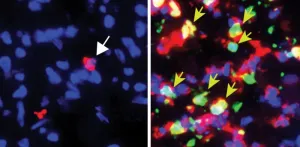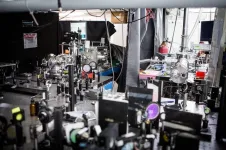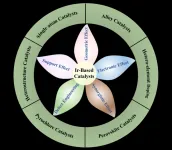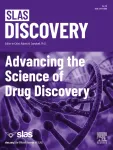(Press-News.org) White blood cells called neutrophils have an unappreciated role in eradicating solid tumors, according to a surprise discovery from a team led by Weill Cornell Medicine scientists.
In the study, published March 30 in Cell, the researchers investigated how a T cell-based immunotherapy was able to destroy melanoma tumors even though many of the tumor cells lacked the markers or “antigens” targeted by the T cells. They found that the T cells, in attacking the tumors, activated a swarm of neutrophils—which in turn killed the tumor cells that the T cells couldn’t eliminate. The findings could lead to new immunotherapies that harness this unexpected but potent antitumor immune response.
“We have tended to think of innate cells as immune cells that, at best, can help stimulate an initial T cell response to a tumor. In addition, many studies have shown that neutrophils support tumor progression, but here we reveal that they can have a critical role in eliminating and finishing off a tumor that would otherwise escape a T cell therapy,” said study co-senior author Dr. Taha Merghoub, deputy director of the Sandra and Edward Meyer Cancer Center, the Margaret and Herman Sokol Professor of Oncology Research and a professor of pharmacology at Weill Cornell Medicine, and co-director of the Ludwig Collaborative Laboratory.
“This work clearly shows us that the monolithic term ‘neutrophil’ needs to be more specific, based on the use of single-cell technology,” said co-senior author Dr. Jedd Wolchok, the Meyer Director of the Meyer Cancer Center and a professor of medicine at Weill Cornell Medicine, co-director of the Ludwig Collaborative Laboratory and an oncologist at NewYork-Presbyterian/Weill Cornell Medical Center. “In the past, this general term referred to a population of cells that were not thought to be helpful in controlling tumors. We now know that a subset of these cells is critical in optimizing engineered T cell therapies to overcome heterogeneity.”
Cancer immunotherapies, which harness or boost immune cells’ ability to attack malignant cells, have begun to revolutionize cancer treatment over the past decade. In some cases, these therapies have essentially cured advanced cancer patients who would have had no hope of survival otherwise. Yet for most cancers, immunotherapies are effective in only a minority of patients. In general, researchers still have much to learn about how anticancer immunotherapies work and how their effectiveness can be improved.
In the study, the researchers investigated an experimental immunotherapy that includes a drug to boost T cell activity and proliferation, plus T cells that have been engineered to recognize a melanoma-associated antigen. Tumors sometimes can evade an immunotherapy targeting a specific tumor antigen simply by ceasing to express that antigen—the tumor cells that don’t express the antigen are called “escape variants.” However, the researchers found that their boosted T cell therapy could eliminate melanomas, in standard mouse models, even when a large portion of the melanoma cells lacked the targeted antigen, Trp1.
Ultimately, they determined that the initial anti-tumor activity of the T cells against Trp1-expressing melanoma cells triggered a secondary tumor-killing response—from neutrophils. These white blood cells are best known as first-responders to infections and wounds. As members of the evolutionary older “innate” immune system, they do not target specific antigens in the way that T cells do. Yet the researchers concluded that the neutrophils summoned by their T-cell immunotherapy were indeed responsible for killing off the remaining, non-Trp1-expressing melanoma cells—at least in part by secreting the highly reactive molecule nitric oxide.
As part of the study, the researchers identified a characteristic gene expression pattern in the antitumor neutrophils, and found that in a widely used database on melanoma patients, the greater presence of this gene-expression “signature” in biopsied tumor samples was associated with better outcomes for patients.
The results were especially surprising because prior studies have shown that neutrophils around a tumor often act as allies of the tumor—the tumor co-opts them to help it survive and spread, which they do in part by suppressing other elements of antitumor immunity.
In any case, the new findings suggest that in the context of a strong immunotherapy that includes engineered T-cells targeting tumor antigens, and a general boosting of T-cell functions, neutrophils can play a significant antitumor role—in fact, an essential role in mopping up escape variant tumor cells that would otherwise keep the tumor alive.
“Conventional T cell-based therapies have been successful in treating cancers, but they are not as effective against heterogenous tumors, which have antigen escape variants that can be invisible to the immune system,” said Dr. Daniel Hirschhorn, an assistant professor of research in pharmacology at Weill Cornell Medicine. “It was incredibly surprising to discover that T cell-educated neutrophils can eliminate these ‘invisible’ tumor cells. This discovery highlights the importance of mobilizing multiple arms of the immune system in the fight against cancer.”
The researchers now are continuing to study these anti-tumor neutrophils, to determine how they can best be induced and directed—as cancer-fighters on their own, or as enhancers of other immunotherapies.
“I also hope that we can find a way to use measures of these antitumor neutrophils in tumor biopsies as biomarkers that help us choose the best therapies for patients,” Dr. Merghoub said.
Many Weill Cornell Medicine physicians and scientists maintain relationships and collaborate with external organizations to foster scientific innovation and provide expert guidance. The institution makes these disclosures public to ensure transparency. For this information, see profile for Dr. Wolchok.
END
Surprise finding shows that neutrophils can be key antitumor weapons
2023-03-30
ELSE PRESS RELEASES FROM THIS DATE:
Monitoring chronic disease burden: EHRs can help meet a serious public health challenge
2023-03-30
INDIANAPOLIS – The pandemic has highlighted the importance of increasing the flow of information on infectious diseases from electronic health records (EHRs) to public health agencies. Less attention has been paid to the value of EHR data for chronic disease surveillance.
At the HIMSS (Healthcare Information and Management Systems Society) Global Health Conference & Exhibition (HIMSS23), Brian Dixon, PhD, MPA, of Regenstrief Institute and Indiana University Richard M. Fairbanks School of Public Health and Lorna Thorpe, PhD, MPH, of NYU Grossman School of Medicine, will ...
Exploiting dark autoionizing states for enhancing the extreme ultraviolet laser power
2023-03-30
Exploiting dark autoionizing states for enhancing the extreme ultraviolet laser power
A research team unravels a new optical phenomenon involving dark autoionizing states, enhancing the power of an extreme-ultraviolet laser.
An international research team led by Professors Tsuneyuki Ozaki and François Légaré at the Institut national de la recherche scientifique (INRS), has developed a unique method to enhance the power of a laser source emitting extreme ultraviolet light pulses. The underlying mechanism of the newly observed phenomenon involves the ...
Iridium-based catalysts look set to boost efficiency of green hydrogen production
2023-03-30
Hydrogen production powered by wind and solar energy is still too expensive if it is to play a role in the clean transition via energy storage and to help decarbonize hard-to-electrify sectors. Much effort in reducing its cost focuses on enhancing production efficiency by improving the performance of iridium-based catalysts that can speed up the oxygen-related part of the electrochemical reaction involved in splitting water into its component parts, hydrogen and oxygen. A new review of the state of the field discusses its recent progress and challenges and identifies research gaps that need to be filled before such ...
A promising outlook: CAR T cells improve patient quality of life
2023-03-30
(WASHINGTON, March 30, 2023) – Chimeric antigen receptor T-cell (CAR-T) therapy has transformed cancer treatment, yet relatively few studies have investigated the impact of the therapy on longitudinal patient quality of life – an aspect of care that often suffers from receiving traditional intensive cancer medications, such as chemotherapy. A new study published in Blood Advances demonstrates that some effective cancer treatments do improve quality of life, revealing that patients with blood cancers experienced ...
E. John Wherry, PhD, recognized with the 2023 AACR-Cancer Research Institute Lloyd J. Old Award in Cancer Immunology
2023-03-30
PHILADELPHIA – The American Association for Cancer Research (AACR) will award E. John Wherry, PhD, with the 2023 AACR-Cancer Research Institute (CRI) Lloyd J. Old Award in Cancer Immunology during the AACR Annual Meeting 2023, April 14-19 at the Orange County Convention Center in Orlando, Florida.
Wherry is chair of the Department of Systems Pharmacology and Translational Therapeutics, director of the Institute for Immunology, and founding director of the Immune Health Project in the Perelman School of Medicine at the University of Pennsylvania. He is being honored for ...
Surgery proves effective alternative to chemotherapy and radiation for early metastatic testicular cancer
2023-03-30
LOS ANGELES — A newly published study paves the way for some patients with testicular cancer to avoid chemotherapy and radiation.
Seminoma is a slow-growing form of testicular cancer that if untreated, typically metastasizes (spreads) to lymph nodes in an area behind the abdomen lining called the retroperitoneum. The standard treatment for patients at this stage is chemotherapy and radiation to shrink and kill the cancerous lymph nodes.
While effective, chemotherapy and radiation are associated with long-term side effects, such as cardiovascular disease and secondary cancers, that adversely affect a patient’s quality of life.
Now, however, the results of a multi-institutional ...
BGI Genomics partners with Zentya to launch fecal DNA test for colorectal cancer in Slovakia
2023-03-30
Bratislava, Slovakia, March 21, 2023
BGI Genomics is pleased to announce the launch of COLOTECTTM 1.0 in Slovakia, in collaboration with its local partner, Zentya. Zentya is a Slovak-based healthcare solution provider that is passionate about providing patients with the latest technology in the field of genetic screening, aiming to help identify and facilitate timely treatments of genetic diseases.
COLOTECTTM 1.0 is one of the first-ever fecal DNA tests for colorectal cancer that is available in the country. It is a non-invasive fecal DNA test developed by BGI Genomics for detecting ...
Fake news on Facebook increased 2020 election doubts
2023-03-30
PULLMAN, Wash. — Facebook users were more likely to read fake news about the 2020 U.S. presidential election than users of Twitter and other social media websites, a Washington State University-led analysis found.
The study in Government Information Quarterly indicates that fake news consumption and political alignment were the primary forces driving doubt about the integrity of the vote counting process – and surprisingly not the method used to cast votes. The researchers also found that individuals who got ...
SLAS discovery highlights protocols in drug discovery for March special issue
2023-03-30
Oak Brook, IL – The March special issue of SLAS Discovery deviates from its traditional focus on assay technology, disease area or molecular target to introduce and explore protocol articles – the newly accepted article type for outlining detailed scientific methods and procedures. The six protocol articles featured in this month’s collection cover a range of topics such as 3D imaging, cancer treatments and methods of high-throughput screening.
By publishing protocols, SLAS underscores the importance of transparency and rigor ...
Machine learning models rank predictive risks for Alzheimer’s disease
2023-03-30
COLUMBUS, Ohio – Once adults reach age 65, the threshold age for the onset of Alzheimer’s disease, the extent of their genetic risk may outweigh age as a predictor of whether they will develop the fatal brain disorder, a new study suggests.
The study, published recently in the journal Scientific Reports, is the first to construct machine learning models with genetic risk scores, non-genetic information and electronic health record data from nearly half a million individuals to rank risk factors in order of how strong their association is with eventual development of ...






